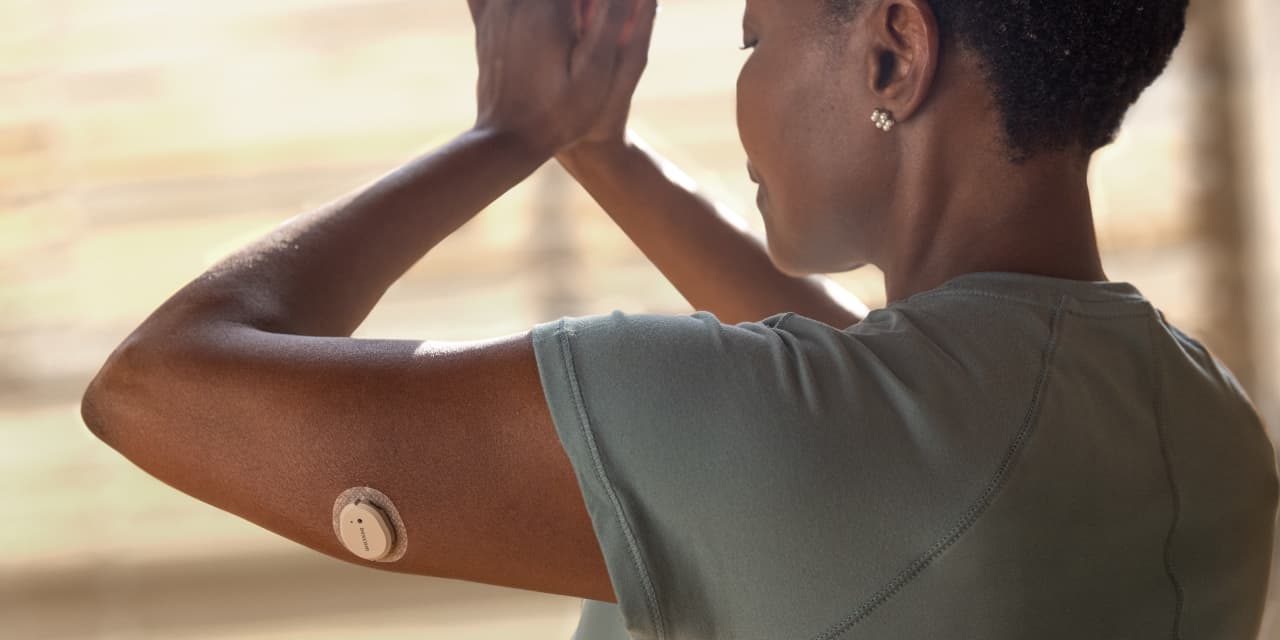The weight-loss drugs called GLP-1s are producing some of the market’s biggest losers: investors in companies that treat obesity complications.
Outside the GLP-1 revels, their echo casts gloom over shares of businesses that grew with America’s waistlines.
Insulin-pump makers
Insulet
(PODD) and
Tandem Diabetes Care
(TNDM) are down 40% and 50% this year, respectively, while the glucose monitor leader
DexCom
(DXCM) has lost 16%.
ResMed
(RMD) dominates the devices called “CPAP” machines that treat sleep apnea. Its stock is off 30%. Inspire Medical Systems (INSP) sells another sleep apnea device, and its shares have dropped 18%. Liver-disease drug developer
Madrigal Pharmaceuticals
(MDGL) is down 40%.
Before GLP-1s grabbed center stage, these firms’ sales growth made them some of the highest-valued medical stocks on the market. Now, investors are looking to a future when fewer people develop diabetes and sleep apnea, so they’re dumping the stocks.
“It’s impossible to disprove a negative,” grumbles
J.P. Morgan
medical technology analyst Robbie Marcus. “To prove that this market won’t get cut by X percent…there’s no way you can do that.”
Turning the tide of obesity will take years, so plenty of patients will still need these companies’ help. But even after their summer slide, stocks like DexCom and Insulet have traded near triple-digit earnings multiples. As GLP-1 sales ramp up, those multiples may ramp down.
While the average human life span has increased in recent decades, the years lived in good health haven’t kept pace. That’s largely because of obesity and its complications. In just the U.S., the medical costs of obesity are estimated to run to the hundreds of billions a year.
Obesity seemed untamable, before Novo Nordisk and Lilly found drugs that let people shed 15% to 20% of their weight. Wall Street sees the duo’s sales of the drugs exceeding $40 billion a year by the decade’s end, according to Visible Alpha.
In early spring, the implications of a world on GLP-1s became topics of Monday morning brainstorming sessions at hedge funds. Some began exiting stocks like DexCom and Madrigal—and then betting on their decline by selling shares short.
The wider market started paying attention this summer. On July 20, the surgical-robot maker
Intuitive Surgical
(ISRG) mentioned on its earnings call that patients were deferring weight-loss surgery to try GLP-1s first. Those procedures are a small percentage of robotic surgeries, but a contributor to Intuitive’s growth.
On Aug. 8, Novo Nordisk released a study showing that overweight patients on Wegovy had 20% fewer strokes and cardiac events after losing weight on the drug. Investors started believing that GLP-1s could reduce obesity-related illnesses, and the markets for their remedies.
“Those two events really catalyzed this imperceptible, intangible fear and crystallized it,” said J.P. Morgan’s Marcus. “From that point on, it’s just been nonstop GLP-1.”
Obesity-associated medtechs are still falling. “Everyone has become trigger-happy with GLP-1s—putting bullets in medtech,” said Will Sevush, the analyst for healthcare strategies at Jefferies.
The insulin pump firms Insulet and
Tandem
already sell well to patients with the autoimmune form of diabetes known as Type 1. For their next leg of growth, the pump vendors are looking to Type 2 diabetes, which most commonly results from obesity. Several million Americans have Type 2 diabetes that has gotten bad enough for them to need insulin injections. Few use pumps.
GLP-1s could crimp that opportunity. Last month, Baird analyst Jeff Johnson surveyed 25 endocrinologists and was surprised when they suggested that GLP-1s could delay the progression to insulin for half of their Type 2 patients. Johnson cut his sales forecast and stock price targets. His target for Insulet went from $320 to $219, and his rating went from Outperform to Neutral.
Insulet declined to discuss GLP-1s with Barron’s, and Tandem didn’t respond to our queries. At the Baird healthcare conference this month, Insulet CEO James Hollingshead told the audience that GLP-1s haven’t affected his company’s 40% year-over-year growth. Patients have trouble getting insurance coverage for GLP-1 drugs, he said, and most stop taking them within two years.
Baird analyst Johnson doesn’t think GLP-1s will slow the growth of glucose monitor maker DexCom in the Type 2 market. While taking down his price target, from $153 to $130, Johnson maintained his Outperform rating. So did Raymond James analyst Jayson Bedford, in a note this month arguing that diabetic patients will use glucose monitors along with GLP-1s.
That aligns with a DexCom statement to Barron’s, which says glucose monitoring will complement GLP-1 use in Type 2 diabetes. The company says its market extends beyond diabetes, because healthy people will want to track their glucose levels as they diet and exercise.
DexCom stock rallied for a few days this month, after the company circulated insurance data suggesting that use of its monitors went up among Type 2 patients who started on GLP-1s. The numbers were old, however, and didn’t address whether widening use of GLP-1s in coming years will shrink the number of people who need to monitor their glucose.
DexCom shares soon resumed their slide. Its recent levels still represent 70 times earnings, so an investor is betting GLP-1s won’t shrink DexCom’s opportunity.
The sleep apnea device vendors, ResMed and Inspire Medical, also tell investors that GLP-1s won’t hurt their markets. Inspire Investor Relations Officer Ezgi Yagci told Barron’s that her company’s nerve-stimulating device isn’t recommended for patients with high body mass. “We believe GLP-1s will expand Inspire’s addressable market,” she wrote.
ResMed CEO Mick Farrell told Barron’s that the company had seen no impact on new patient flow because of GLP-1s. “We believe that increased utilization of GLP-1s to treat obesity will bring many new people into the healthcare funnel,” said Farrell in a written statement. “We believe that this will open them up to sleep apnea awareness, diagnosis, and treatment pathways.”
Many analysts think the drop in the sleep apnea stocks has more than accounted for the modest impact they foresee from GLP-1s. That was the thinking of Needham’s Mike Matson when he raised ResMed to a Buy this month.
Jefferies’ Will Sevush disagrees. Most sleep apnea patients are overweight, he told Barron’s, and studies of patients who had weight-loss surgery showed that many were relieved of their sleep apnea. “Obesity is clearly the driver,” said Sevush. “GLP-1s are going to impact everything that touches sleep apnea.”
One more stock sector got hurt by the good news on GLP-1s: liver drugs.
In June, a study showed that the Lilly experimental drug retatrutide not only let people lose 24% of their weight, but also cleared the high fat levels in their livers. That weighed on shares of companies like Madrigal Pharmaceuticals, which are developing drugs for the fatty liver disease known as NASH.
NASH can destroy a liver, and there’s no approved treatment—so Wall Street had high regard for Madrigal and others developing NASH drugs, like
Akero Therapeutics
(AKRO) and
89bio
(ETNB).
Having just changed CEOs, Madrigal begged off from talking with Barron’s. At 89bio, CEO Rohan Palekar said it could take a decade before NASH cases start declining from GLP-1 usage. Meanwhile, patients will need NASH drugs, he said.
An enormous population of young and middle-age people suffer from obesity-driven liver disease, said Nezam Afdhal, a NASH expert at Harvard’s Beth Israel Deaconess Medical Center. While GLP-1s may reduce liver fat, he noted that they haven’t been shown to reduce the liver’s deadly scar tissue like the NASH drugs.
J.P. Morgan’s Marcus has maintained his Overweight ratings on DexCom, Insulet, and Inspire—confident they’ll do well in a GLP-1 world. But he worries that investors will adopt a nightmare scenario for medtech, if they embrace the GLP-1 dream.
“If you’re dreaming really big on the plus side, you could be expecting a big negative on the downside,” he said.
Write to Bill Alpert at william.alpert@barrons.com
Read the full article here













Leave a Reply